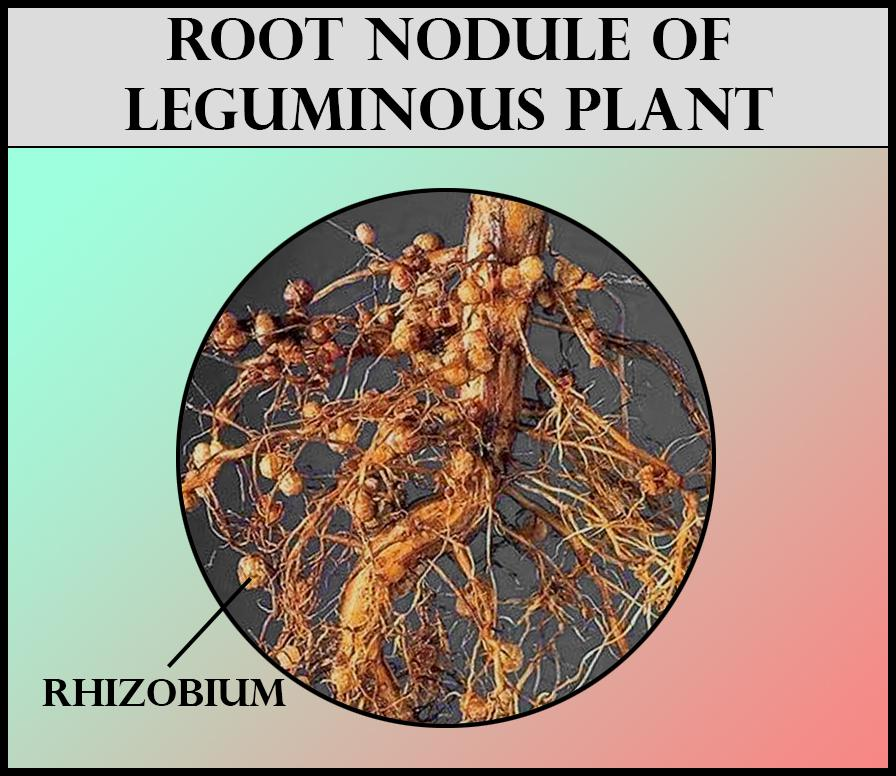
Nif genes occur in
(a) Rhizobium
(b) Aspergillus
(c) Penicillium
(d)Streptococcus
Answer
565.5k+ views
Hint: The Nif genes are responsible to encode enzymes that are involved in the fixation of atmospheric nitrogen and are found in bacteria present in root nodules of leguminous plants.
Complete answer:
Rhizobium is a symbiotic genus of Gram-negative soil bacteria that fix nitrogen with the aid of the enzymes provided by the nif genes. These bacteria colonize plant cells within the root, forming nodules. Here they convert atmospheric nitrogen into ammonia using the enzyme nitrogenase complex, which is the primary enzyme encoded by the nif genes, and then provides organic nitrogenous compounds such as glutamine or ureides to the plant. The plants, in turn, provide the bacteria with organic compounds made by photosynthesis.
Additional Information: -Aspergillus is a fungus that contains spores that remain present in the air we breathe. Common Aspergillus infections include aspergillosis, ABPA CPA, and aspergilloma.
-Penicillium is a genus of fungi that produce antibiotic penicillin.
-Gram-positive coccus (plural cocci) or spherical bacteria belongs to the genus streptococcus.
So, the correct answer is,’ Rhizobium’.
Note: -The nif genes are found in both free-living nitrogen-fixing bacteria and symbiotic bacteria.
-Apart from the nitrogenase enzyme, the nif genes also encode several regulatory proteins involved in nitrogen fixation.
-The nif gene expression is induced when the concentrations of fixed nitrogen and oxygen concentrations are low (the low oxygen concentrations are actively maintained in the root environment of host plants).

Complete answer:
Rhizobium is a symbiotic genus of Gram-negative soil bacteria that fix nitrogen with the aid of the enzymes provided by the nif genes. These bacteria colonize plant cells within the root, forming nodules. Here they convert atmospheric nitrogen into ammonia using the enzyme nitrogenase complex, which is the primary enzyme encoded by the nif genes, and then provides organic nitrogenous compounds such as glutamine or ureides to the plant. The plants, in turn, provide the bacteria with organic compounds made by photosynthesis.
Additional Information: -Aspergillus is a fungus that contains spores that remain present in the air we breathe. Common Aspergillus infections include aspergillosis, ABPA CPA, and aspergilloma.
-Penicillium is a genus of fungi that produce antibiotic penicillin.
-Gram-positive coccus (plural cocci) or spherical bacteria belongs to the genus streptococcus.
So, the correct answer is,’ Rhizobium’.
Note: -The nif genes are found in both free-living nitrogen-fixing bacteria and symbiotic bacteria.
-Apart from the nitrogenase enzyme, the nif genes also encode several regulatory proteins involved in nitrogen fixation.
-The nif gene expression is induced when the concentrations of fixed nitrogen and oxygen concentrations are low (the low oxygen concentrations are actively maintained in the root environment of host plants).

Recently Updated Pages
Master Class 12 Economics: Engaging Questions & Answers for Success

Master Class 12 Physics: Engaging Questions & Answers for Success

Master Class 12 English: Engaging Questions & Answers for Success

Master Class 12 Social Science: Engaging Questions & Answers for Success

Master Class 12 Maths: Engaging Questions & Answers for Success

Master Class 12 Business Studies: Engaging Questions & Answers for Success

Trending doubts
Which are the Top 10 Largest Countries of the World?

What are the major means of transport Explain each class 12 social science CBSE

Draw a labelled sketch of the human eye class 12 physics CBSE

What is a transformer Explain the principle construction class 12 physics CBSE

Why cannot DNA pass through cell membranes class 12 biology CBSE

Differentiate between insitu conservation and exsitu class 12 biology CBSE




